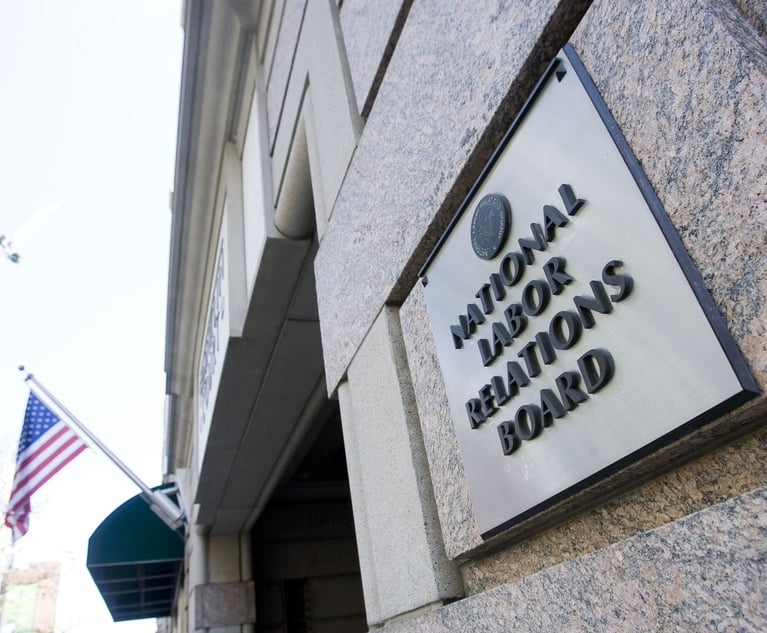How to Determine What Is 'Essential Business' as More States Order Shutdowns
Violations of orders usually result in a misdemeanor offense, which can mean a fine, imprisonment or both. So far it is unclear how the orders will be enforced.
March 23, 2020 at 05:29 PM
4 minute read
 Thomas Lee and Hope Goldstein, Bryan Cave Leighton Paisner
Thomas Lee and Hope Goldstein, Bryan Cave Leighton Paisner
As a growing number of states proceed with unprecedented stay-at-home orders, including the closing of nonessential businesses, general counsel are struggling with the definitions as they guide their companies to comply.
Connecticut, Michigan and Wisconsin this week are the latest of at least 15 states, four cities and one territory that ordered nonessential businesses to close. The other states are California, Delaware, Illinois, Kentucky, Louisiana, Maryland, Nevada, New York, New Jersey, Ohio, Pennsylvania and Rhodes Island, plus Puerto Rico; Dallas; Kansas City, Missouri; Nashville, Tennessee; and St. Louis.
Nearly all states have closed public schools and most have urged people not to gather in groups. Many have also closed bars and restaurants and recommended, but not yet ordered, nonessential businesses to close.
So what is a nonessential business? The definition can vary from state to state, and even city to city.
For this reason, employment law firm Fisher & Phillips over the weekend created an Essential Business Task Force to help general counsel and their companies navigate state and local government closure orders.
On Monday two attorneys at Bryan Cave Leighton Paisner offered a short webinar on shutdown and shelter in place orders, including the important role of in-house counsel in guiding the company. The law firm said mostly in-house counsel are registering for its series of coronavirus-related webinars.
Thomas Lee, a partner in the law firm's San Francisco office, stressed that the situation is fluid, and more governments are issuing orders or revising guidance daily. Businesses need to stay on top of new developments, Lee said.
Lee along with employment attorney Hope Goldstein from the New York office, hit these points:
- The definition of an essential business can vary widely, depending on the order. Some adopt the 16 critical infrastructure sectors announced March 19 by the federal government, but many also add their own categories. The specifics of each order must be studied and applied.
- Companies need to know where their operations are located, and what critical work is done there, and what part of the workforce can work remotely. Those are the facts that counsel will use to evaluate whether each facility qualifies as essential.
- If a company thinks a shutdown order is likely coming in its area, it can reach out to the government and make a case for being included in essential services. Such efforts have received varied responses, some successful.
- Businesses need to keep abreast of employment law changes that also are coming rapidly, including what qualifies for paid leave or immediate unemployment pay.
- Violations of orders usually result in a misdemeanor offense, which can mean a fine, imprisonment or both. So far it is unclear how the orders will be enforced.
Lee told Corporate Counsel that once a company has decided to keep operating, in-house counsel can continue playing a key role by providing essential service letters for employees to carry in transit, as well as letters for facility personnel to provide to inspectors if they visit a facility.
He said the company also should reach out "to key upstream suppliers to ensure supply chain stability, and to customers to confirm continued operations."
Lee recommended implementing the Centers for Disease Control and Prevention cleaning guidance, social distancing and teleworking where possible.
He said to "make sure that all relevant levels of the company understand what the decision is with respect to a facility, and manage feedback from employees who may have concerns."
This content has been archived. It is available through our partners, LexisNexis® and Bloomberg Law.
To view this content, please continue to their sites.
Not a Lexis Subscriber?
Subscribe Now
Not a Bloomberg Law Subscriber?
Subscribe Now
NOT FOR REPRINT
© 2025 ALM Global, LLC, All Rights Reserved. Request academic re-use from www.copyright.com. All other uses, submit a request to [email protected]. For more information visit Asset & Logo Licensing.
You Might Like
View All


Trump Fires EEOC Commissioners, Kneecapping Democrat-Controlled Civil Rights Agency

Testing Legal Authority, Trump Fires NLRB Member, Leaving Panel Without Quorum
3 minute readLaw Firms Mentioned
Trending Stories
- 1Trending Issues in Florida Construction Law That Attorneys Need to Be Aware Of
- 2The Importance of Judicial Elections
- 3Ephemeral Messaging Going Into 2025:The Messages May Vanish But Not The Preservation Obligations
- 4Decision of the Day: Trial Court's Sidestep of 'Batson' Deprived Defendant of Challenge to Jury Discrimination
- 5Is Your Law Firm Growing Fast Enough? Scale, Consolidation and Competition
Who Got The Work
J. Brugh Lower of Gibbons has entered an appearance for industrial equipment supplier Devco Corporation in a pending trademark infringement lawsuit. The suit, accusing the defendant of selling knock-off Graco products, was filed Dec. 18 in New Jersey District Court by Rivkin Radler on behalf of Graco Inc. and Graco Minnesota. The case, assigned to U.S. District Judge Zahid N. Quraishi, is 3:24-cv-11294, Graco Inc. et al v. Devco Corporation.
Who Got The Work
Rebecca Maller-Stein and Kent A. Yalowitz of Arnold & Porter Kaye Scholer have entered their appearances for Hanaco Venture Capital and its executives, Lior Prosor and David Frankel, in a pending securities lawsuit. The action, filed on Dec. 24 in New York Southern District Court by Zell, Aron & Co. on behalf of Goldeneye Advisors, accuses the defendants of negligently and fraudulently managing the plaintiff's $1 million investment. The case, assigned to U.S. District Judge Vernon S. Broderick, is 1:24-cv-09918, Goldeneye Advisors, LLC v. Hanaco Venture Capital, Ltd. et al.
Who Got The Work
Attorneys from A&O Shearman has stepped in as defense counsel for Toronto-Dominion Bank and other defendants in a pending securities class action. The suit, filed Dec. 11 in New York Southern District Court by Bleichmar Fonti & Auld, accuses the defendants of concealing the bank's 'pervasive' deficiencies in regards to its compliance with the Bank Secrecy Act and the quality of its anti-money laundering controls. The case, assigned to U.S. District Judge Arun Subramanian, is 1:24-cv-09445, Gonzalez v. The Toronto-Dominion Bank et al.
Who Got The Work
Crown Castle International, a Pennsylvania company providing shared communications infrastructure, has turned to Luke D. Wolf of Gordon Rees Scully Mansukhani to fend off a pending breach-of-contract lawsuit. The court action, filed Nov. 25 in Michigan Eastern District Court by Hooper Hathaway PC on behalf of The Town Residences LLC, accuses Crown Castle of failing to transfer approximately $30,000 in utility payments from T-Mobile in breach of a roof-top lease and assignment agreement. The case, assigned to U.S. District Judge Susan K. Declercq, is 2:24-cv-13131, The Town Residences LLC v. T-Mobile US, Inc. et al.
Who Got The Work
Wilfred P. Coronato and Daniel M. Schwartz of McCarter & English have stepped in as defense counsel to Electrolux Home Products Inc. in a pending product liability lawsuit. The court action, filed Nov. 26 in New York Eastern District Court by Poulos Lopiccolo PC and Nagel Rice LLP on behalf of David Stern, alleges that the defendant's refrigerators’ drawers and shelving repeatedly break and fall apart within months after purchase. The case, assigned to U.S. District Judge Joan M. Azrack, is 2:24-cv-08204, Stern v. Electrolux Home Products, Inc.
Featured Firms
Law Offices of Gary Martin Hays & Associates, P.C.
(470) 294-1674
Law Offices of Mark E. Salomone
(857) 444-6468
Smith & Hassler
(713) 739-1250






